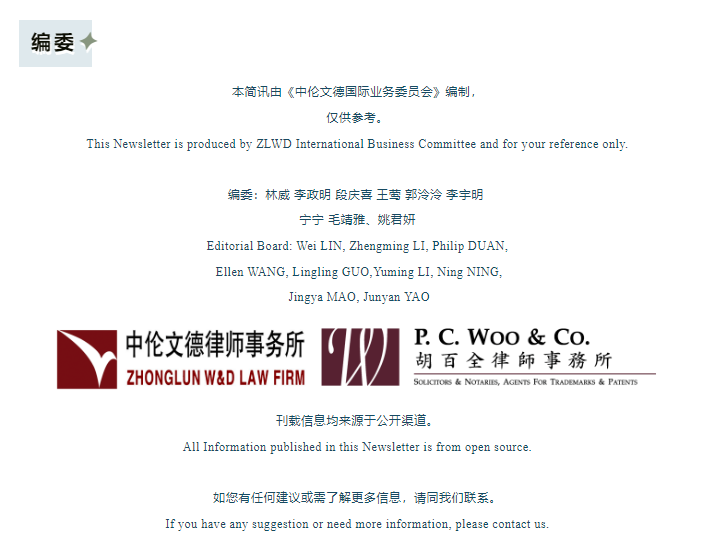
NEWS

NEWS

Japan and Greece Officially Become Countries of the Model Law on International Commercial Arbitration
According to the official website of the United Nations Commission on International Trade Law (UNCITRAL), Japan and Greece have officially become countries of the UNCITRAL Model Law on International Commercial Arbitration (hereinafter referred to as the "Model Law").
The Model Law was formulated under the auspices of the UNCITRAL in 1985. The Model Law is not enforceable and is intended to serve as a reference for Member States in the formulation of their national laws. Up to date, 87 countries and 120 jurisdictions have based their legislation or amended their arbitration laws on the Model Law.
The Model Law is designed to assist States in reforming and modernizing their laws on arbitral procedure so as to take into account the particular features and needs of international commercial arbitration. It covers all stages of the arbitral process from the arbitration agreement, the composition and jurisdiction of the arbitral tribunal and the extent of court intervention through to the recognition and enforcement of the arbitral award.
Annual Report on International Commercial Arbitration in China (2022-2023) Released
On 5 September 2023, the China International Economic and Trade Arbitration Commission (CIETAC) released the Annual Report on International Commercial Arbitration in China (2022-2023) (hereinafter referred to as the "Report").
The Report shows that China's arbitration industry has basically recovered to the pre-covid-19 level in 2022, with a total of 475,173 cases handled by 277 arbitration institutions nationwide, an increase of 59,284 cases and 14.25 % year-on-year from 2021; and the total subject matter amount of arbitration cases nationwide was 986 billion yuan, an increase of 126.7 billion yuan and 14.74 % year-on-year from 2021. Among them, the total number of traditional commercial arbitration cases was 320,262, an increase of 19.11 % year-on-year; 89 arbitration institutions handled 154,911 cases using online arbitration, an increase of 5.40 % year-on-year.
The Report also shows that the influence of Chinese arbitration has been continuously expanded through the organisation of influential international arbitration brand events such as the China Arbitration Week, the China Arbitration Summit Forum, the International Investment Arbitration Summit Forum, and the joint release of the Beijing Joint Declaration Cooperation Mechanism of "Belt and Road" Arbitration Institutions.
China's international commercial arbitration institutions have not only seen a gradual increase in the number of cases handled, but also a steady improvement in the quality of the cases handled, as well as a gradual expansion of their international influence.
CPC Central Committee, State Council:Supporting Cross-Strait Arbitration Institutions' Exchanges and Co-operation
On 12 September 2023, CPC Central Committee, State Council issued the Opinions of the CPC Central Committee and State Council on Supporting Fujian in Exploring a New Path for Integrated Cross-Straits Development and Establishing a Demonstration Zone for Integrated Cross-Straits Development (hereinafter referred to as the "Opinions").
The Opinions state to improve the Taiwan-related judicial services. It is imperative to create an open resource sharing platform that integrates Taiwan-related legal research and consultation and the legal investigation of Taiwan region. It is also imperative to strengthen the communication and cooperation of arbitration institutions across the Taiwan Straits, and allow the Taiwanese civil and commercial arbitration institutions to set up business institutions in Xiamen to conduct arbitration business involving Hong Kong, Macao and Taiwan as well as foreign-related matters. Moreover, it is imperative to create an optimal region to provide Taiwan-related judicial services to provide legal guarantee for Taiwan compatriots and Taiwan enterprises to participate in the integrated cross-Straits development. It is imperative to continue to optimize the Taiwan-related law enforcement, procuratorial work, adjudication, enforcement supervision and other mechanisms, and continue to improve Taiwan-related legal services.
Beijing Fourth Intermediate People's Court:
Respondent's Claim for a Deduction of the Breach of Contract Damages by Way of Defence, Which the Arbitral Institution Examined and Ruled to Set Off, did not Exceed the Scope of the Arbitration Award
Legal Basis:
Interpretation of the Supreme People's Court on Issues Relating to Application of Law in Hearing Cases of Disputes over Sales Contracts
Article 31
Where a seller, after having performed delivery obligation, requests the buyer to make payment, but the buyer raises an objection citing that the seller has defaulted first, the People's Court shall deal with the case respectively pursuant to the following circumstances:
(1) if the buyer refuses to pay the liquidated damages, refuses to compensate for losses or claims that the seller shall take remedial measures such as reduction on the price, it shall be deemed as a defense; or
(2) if the buyer claims that the seller shall pay the liquidated damages, compensate for losses or requests the rescission of the contract, it shall file a counterclaim.
Case Description:
On 18 August 2022, Shaanxi Fenghui Building Materials Technology Co., Ltd. (hereinafter referred to as "Fenghui Company") filed an arbitration claim with the Hubei Sub-Committee of China International Economic and Trade Arbitration Commission (hereinafter referred to as the "Hubei Sub-Committee of CIETAC") against China Nuclear Industry 22nd Construction Co., Ltd. (hereinafter referred to as "Nuclear Industry Company") for the payment of RMB 797,713.36 to Fenghui Company for the defaulted rent, additional sales, loss compensation, etc. On 16 May 2023, the Hubei Sub-Committee of CIETAC issued (2023) China Maozhong Hubei Award No. 0031 (hereinafter referred to as "Award No. 0031") which basically supported Fenghui Compnay's claims of the defaulted rent, additional sales, loss compensation, at the same time, in view of the defence of the Nuclear Industry Company, at the same time, in view of the defence of the Nuclear Industry Company, the arbitral tribunal considered that Fenghui Company had caused losses to the Nuclear Industry Company due to its failure to enter the site on time, and the deduction of the project payment and the default payment due to the same legal fact was not necessary to be claimed in the form of counterclaim and could be claimed in the form of defense. The claim for deduction by way of defence was in fact a claim for set-off, and the arbitration tribunal finally ruled that the Nuclear Industry Company should pay to Fenghui Company a total of RMB 552,286.04 for the arrears of rent, compensation for loss, and costs of opening up, scrapping and cleaning costs.
Fenghui Company disagreed with the Award No. 0031 and requested the Beijing Fourth Intermediate People's Court (hereinafter referred to as the "Court") to set aside the Award No. 0031. Fenghui Company argued that the arbitration award did not comply with the provisions of the Arbitration Law.
Although the subject matter of this case was a lease contract dispute, the relevant provisions of the sale and purchase contract could be applied by reference when there were no relevant provisions on lease contract in the law. According to Article 31 of Interpretation of the Supreme People's Court on Issues Relating to Application of Law in Hearing Cases of Disputes over Sales Contracts, if the Nuclear Industry Company claimed that Fenghui Company should pay liquidated damages and compensation for losses, it should make counterclaims, that is, it should make counterclaims in the form of arbitration in the arbitration proceedings. In this case, the arbitration tribunal, in the absence of a counterclaim submitted in writing by the nuclear industry company and without paying the arbitration fee for the counterclaim, made a determination of losses and liquidated damages, which not only violated the arbitration procedure of the relevant provisions of the counterclaim, but also deprived Fenghui Company of the time limit for defence and proof.
Court’s View:
I. On Fenghui Company's claim that the Nuclear Industry Company only proposed the deduction of liquidated damages by way of defence but not by way of counterclaim in arbitration, the CIETAC Decision found that the set-off belonged to exceeding the scope of the arbitration award and the application of the law was wrong.
The Court held that the rent and loss settlement claimed by Fenghui Company and the liquidated damages claimed by the Nuclear Industry Company were based on the same legal fact, and the law did not require the respondent to claim the liquidated damages in the form of counterclaim, and accordingly, the Nuclear Industry Company demanded to deduct the liquidated damages when settling the rent in the form of defence, and the CIETAC examined and ruled to set off the claim to reduce the litigation fatigue and the cost of dispute resolution for all parties which was not beyond the scope of arbitration.
Secondly, regarding Fenghui Company's claim that in the absence of a counterclaim by the Nuclear Industry Company, the Hubei Sub-committee of CIETAC had arbitrarily made a determination of the liquidated damages for losses, depriving it of the right of defence and proof, and violating the statutory procedure, the Court held that Fenghui Company had fully expressed its opinions on the liquidated damages and losses proposed by the Nuclear Industry Company in the form of defense in the arbitration hearing, and the Hubei Sub-committee of CIETAC had guaranteed the right of Fenghui Company to put forward its opinions, so there was no such situation of Fenghui Company being deprived of the right of defence and proof, and the Court did not adopt the aforesaid opinions of Fenghui Company.
In conclusion, in accordance with Articles 58 of the Arbitration Law of the People's Republic of China, the Court ruled to reject the application of Shaanxi Fenghui Building Materials Technology Co., Ltd. to set aside the Arbitral Award made by Hubei Sub-committee of China International Economic and Trade Arbitration Commission.
Grand Court of the Cayman Islands:
Interim Injunction Granted in Support of Arbitration between the Hong Kong International Arbitration Centre and the China International Economic and Trade Arbitration Commission
Case Description:
On 20 August 2018, Leed Education Holding Limited, National Education Holding Limited, Hyde Education Holding Limited (hereinafter referred to as "Education Group") as the seller, Minsheng Vocational Education Company Limited (hereinafter referred to as "Minsheng Company") , as the buyer, entered into a share purchase agreement, pursuant to which Minsheng Company first acquired 51 % of the shares of Leed International Education Group (China) Limited (hereinafter referred to as "Leed Group") and has the right to acquire the remaining 49 %. Article 22.2 of the agreement states: “Any dispute arising out of or in connection with the execution, performance or interpretation of this Agreement shall be resolved through friendly negotiation by the Parties; in case of failure to do so, the dispute shall be filed to the Hong Kong International Arbitration Centre (hereinafter referred to as the "HKIAC") for arbitration in Hong Kong under the Administered Arbitration Rules of HKIAC. ” In addition, two loan agreements were entered into between Chongqing Yuecheng Zhiyuan Education Technology Co., Ltd., a designated PRC subsidiary of Minsheng Parent as the PRC Lender and Leed Beijing, a PRC subsidiary indirectly and jointly owned by the Education Group as the PRC borrower, the agreements stipulate that "All disputes arising from or in connection with the implementation of this Agreement or related to this Agreement shall be settled through friendly negotiation. If the negotiation fails, it shall be submitted to the China International Economic and Trade Arbitration Commission (hereinafter referred to as the "CIETAC") for arbitration in Beijing and the award shall be final and binding on all parties to the dispute. During the arbitration process, this Agreement shall continue to be performed except for the part of the dispute which is under arbitration." In addition, Education Group has entered into an agreement with Minsheng Company to pledge the remaining 49 % of the shares as a loan, which provides that "This Charge shall be governed by and construed in accordance with the laws of the Cayman Islands and the Parties irrevocably submit to the non-exclusive jurisdiction of the courts of the Cayman Islands." A dispute arose between the parties over the exercise of the option and arbitration was initiated before the HKIDC and the CIETAC. The Education Group applied to the Grand Court of the Cayman Islands (hereinafter referred to as the "Court") for an interim injunction pursuant to section 11A of the Grand Court Law (2015 Revision) and section 54 of the Arbitration Law 2012, which essentially seeks to prohibit Minsheng Company from taking any action to enforce the pledge of the issued shares of the Education Group granted by the Education Group to Minsheng Company before the HKIDC and CIETAC decisions.
Court’s View:
In the circumstances of this case, it was appropriate to prohibit Minsheng Company from taking any action to enforce the pledge (including the exercise of the power of sale) until the completion of the arbitration in China, or in the event that the CIETAC refused to allow Education Group to proceed with the enforcement of the injunction (subject to Education Group's submission of further evidence to substantiate its claim that it was unable to obtain interim relief following the filing of its request for arbitration before the Chinese arbitral tribunal). The court had to consider the specific principles of international arbitration underlying and established in this case, consider the balance of convenience, balance the risk of prejudice to the parties and consider whether the relief was consistent with those principles.
The Court held that The Court held that the risk of serious and irreparable harm to Education Group from the refusal to grant the injunction is greater than the risk of harm to Minsheng Company from the granting of the injunction. The Court agreed with Education Group that Minsheng Company had not proved that it would suffer substantial or significant harm if the injunction was granted. The injunction will not prejudice or affect Minsheng Company's rights as a mortgagee, which will be preserved unaffected. Minsheng Company may suffer some damage from the fact that it is now unable to sell to a third party, but the extent of this damage has not been proved and, in any event, the need to protect Education Group's rights under the Agreements outweighs the extent of this damage because Minsheng Company has already agreed to be bound by these Agreements.
Furthermore, the form of injunction I propose to make ensures that the applicable principles of international arbitration, and that the primacy of the relevant arbitration, are respected with there being only a minimal effect on the PRC Arbitration (and without this Court making any findings or taking any decisions which are for the CIETAC arbitral tribunal.
In summary, the Grand Court of the Cayman Islands granted an injunction restraining Minsheng Vocational Education Company Limited from enforcing the pledge of 49% of the share capital of Leed International Education Group (China) Limited.


